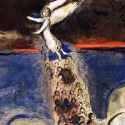|
THE AMERICAN HOLIDAY OF THANKSGIVING (ūŚųĘūÆ ūöųĘūöūĢų╣ūōųĖūÖųĖūö) likely has its roots in the Jewish tradition of giving thanks to God, and some historians believe that the early "pilgrims" derived the idea for the holiday from the Biblical festival of Sukkot, often called "Tabernacles" in the Christian tradition. According to these scholars, before coming to the New World, the pilgrims lived in exile for a decade among the Sephardic Jews in Holland, since Holland was considered a safe haven from religious persecution at the time. Because the pilgrims were devout Calvinists and Puritans, their religious idealism led them to regard themselves as a "new Israel," and it is likely that they both observed the Jews of Holland celebrating the festival of Sukkot and learned that the holiday commemorated Israel's deliverance from their religious persecution in ancient Egypt at that time. After they emigrated to the "Promised Land" of America, it is not surprising that the pilgrims may have chosen the festival of Sukkot as the paradigm for their own celebration of thanksgiving to God. As the Torah commands: "[Celebrate the feast] so that your generations may know that I made the people of Israel dwell in booths when I brought them out of the land of Egypt: I am the LORD your God" (Lev. 23:42-43). The devout pilgrims regarded their perilous journey to the new world as a type of "Exodus event" and therefore sought the appropriate Biblical holiday to commemorate their safe arrival in a land full of new promise...
The LORD instituted the holiday of Sukkot (or "Tabernacles") for us to recall the sheltering presence of God during the forty-year sojourn of our ancestors in the wilderness (Lev. 23:39-43). During this time many families construct a "sukkah," a small hastily built hut in which meals are eaten throughout the seven days of the festival. We decorate our sukkah with hanging fruit, art from our children, and seasonal lights. Inside the sukkah we put tables, chairs, and other items to make the shelter our temporary "home." The theme of the holiday is the transience of life and our gratitude to God for his care. We remember that we are "strangers and sojourners" like our fathers, and that we are just passing through this world on our way to the Heavenly City (Heb. 11:9-10). During Sukkot, which occurs during the time of the fall harvest in Israel, we are particularly commanded to "rejoice before the LORD your God" (Deut. 16:11-15). When we wave our lulavs (i.e., a bouquet of the fruit of the earth and the harvest), it is customary to joyfully sing the familiar refrain of thanks: Hodu La'Adonai ki tov, ki le'olam chasdo: "Give thanks to the LORD for he is good; for his love endures forever" (Psalm 136:1).
ūöūĢų╣ūōūĢų╝ ū£ųĘūÖūöūĢųĖūö ūøų╝ų┤ūÖųŠūśūĢų╣ūæ ūøų╝ų┤ūÖ ū£ų░ūóūĢų╣ū£ųĖūØ ūŚųĘūĪų░ūōų╝ūĢų╣
ūöūĢų╣ūōūĢų╝ ū£ųĄūÉū£ūöųĄūÖ ūöųĖūÉų▒ū£ūöų┤ūÖūØ ūøų╝ų┤ūÖ ū£ų░ūóūĢų╣ū£ųĖūØ ūŚųĘūĪų░ūōų╝ūĢų╣
ūöūĢų╣ūōūĢų╝ ū£ųĘūÉų▓ūōūĀųĄūÖ ūöųĖūÉų▓ūōūĀų┤ūÖūØ ūøų╝ų┤ūÖ ū£ų░ūóū£ųĖūØ ūŚųĘūĪų░ūōų╝ūĢų╣
hoh┬Ędoo ┬Ę la┬ĘAdonai ┬Ę kee ┬Ę tohv: kee ┬Ę le┬Ęoh┬Ęlahm ┬Ę chas┬Ędoh
hoh┬Ędoo lei┬Ęlo┬Ęhei ha-E┬Ęloh┬Ęheem: kee ┬Ę le┬Ęoh┬Ęlahm ┬Ę chas┬Ędoh
hoh┬Ędoo la┬Ęa┬Ędoh┬Ęnei ha┬Ęa┬Ędoh┬Ęneem: kee ┬Ę le┬Ęoh┬Ęlahm ┬Ę chas┬Ędoh

"Give thanks to the LORD, for he is good for his love endures forever.
Give thanks to the God of gods, for his love endures forever.
Give thanks to the Lord of lords, for his love endures forever."
(Psalm 136:1-3)

Hebrew Lesson:
Psalm 136:1 Hebrew Reading:
 |
The Refrains of Praise
A basic principle in Bible interpretation is to note repeated occurrences of a word or phrase. This is sometimes called the "law of recurrence." The assumption here is that since God is the consummate Communicator, if a word or phrase is repeated in Scripture, there is surely a good reason. In some cases the function appears to be instructive (such as the two sets of instructions given for building the Mishkan (tabernacle) in Exodus); in other cases it appears to be exclamatory: the LORD doesn't repeat Himself without the intent of getting our attention.
But notice that the phrase, hodu la-donai ki-tov, ki le'olam chasdo ("Give thanks to the LORD for He is good, for His love endures forever") appears five times in Scripture (1 Chr. 16:34; Psalm 106:1; Psalm 107:1; Psalm 118:1,29; Psalm 136:1), and in each case it is clear that the Holy Spirit is emphasizing that God's love for us -- His chesed -- is the primary reason for us to give Him thanks (in Psalm 136, the refrain, "ki le'olam chasdo" occurs no less than 25 times). Notice also that the verb hodu is the imperative of yadah (to confess or express gratitude) and therefore we can understand this verse to mean that we are to "confess" or "acknowledge" that the LORD is good. Indeed, the Hebrew word todah (ū¬ų╝ūĢų╣ūōųĖūö), usually translated "thanks," can mean both "confession" and "praise."
A Thanksgiving Seder
Thanksgiving is perfectly compatible with Messianic Jewish observance, and since the holiday always falls on a Thursday there is never a conflict with Sabbath celebrations. You can create a simple "Thanksgiving Seder" by reciting Kiddush (the blessing over the wine and the bread) and then offering a special prayer of thanks before eating the meal. Everyone could recite the refrain: "Give thanks to the LORD, for He is good; His love endures forever" (see the Hebrew text above). The "Shehecheyanu" blessing may then be recited to mark the occasion as spiritually significant:
ūæų╝ųĖū©ūĢų╝ūÜų░ ūÉųĘū¬ų╝ųĖūö ūÖų░ūÖųĖ ūÉų▒ū£ūöųĄūÖūĀūĢų╝ ū×ųČū£ųČūÜų░ ūöųĖūóūĢų╣ū£ųĖūØ
ū®ūüųČūöųČūŚų▒ūÖųĖūĀūĢų╝ ūĢų░ū¦ų┤ūÖų╝ų░ū×ųĖūĀūĢų╝ ūĢų░ūöų┤ūÆų╝ų┤ūÖūóųĖūĀūĢų╝ ū£ųĘū¢ų╝ų░ū×ųĘū¤ ūöųĘū¢ų╝ųČūö
ba┬Ęrookh ┬Ę a┬Ętah ┬Ę Adonai ┬Ę E┬Ęlo┬Ęhei┬Ęnoo ┬Ę me┬Ęlekh ┬Ę ha┬Ęo┬Ęlahm
she┬Ęhe┬Ęche┬Ęya┬Ęnoo ┬Ę ve┬Ękee┬Ęye┬Ęma┬Ęnoo ┬Ę ve┬Ęhee┬Ęgee┬Ęa┬Ęnoo ┬Ę la┬Ęze┬Ęmahn ┬Ę ha┬Ęzeh

"Blessed are You, LORD our God, Master of the Universe,
Who has kept us alive and sustained us and brought us to this season."

Download Study Card
During the meal, people might take some time to share their own experience of finding freedom in America or to discuss why they regard freedom as important. The connections between Passover (the Exodus), Shavuot (the Sinai and "Pentecost" experiences), Sukkot (God's care for Israel during their wanderings in the desert), and the American holiday of Thanksgiving would also make an excellent discussion. It is also interesting to note that the Hebrew word for "turkey" is tarnegol hodu (ū¬ų╝ųĘū©ų░ūĀų░ūÆūĢų╣ū£ ūöūĢų╣ūōūĢ), literally, "Indian chicken," which is often shortened to hodu (ūöūĢų╣ūōūĢų╝). It is a happy coincidence that we customarily eat turkey on Thanksgiving, and this reminds us of the "thanks" connection: "Give thanks (hodu) to the LORD, for He is good; for His steadfast love endures forever."
Since Yeshua is the ultimate expression of God's steadfast love (i.e., chesed: ūŚųČūĪųČūō), how much more should we give heartfelt thanks to God for Him? Is there anything greater than the astounding love of God? Can anything overcome it? Can even the hardness of your own heart somehow veto or negate it's purposes? It was because of His great love that God (ūÖūöūĢūö) "emptied Himself" of heavenly glory, becoming clothed in human flesh and becoming disguised a lowly slave (╬┤╬┐ß┐”╬╗╬┐Žé). God performed this act of "infinite condescension" in order to "tabernacle" with us as our "hidden King" (John 1:1,14, Phil. 2:7-8). Ultimately our thanks to God is our praise for Yeshua, our Savior, King, and LORD.
 |
We wish you a joy-filled time of reflection during this Thanksgiving Holiday. May you remember the many blessings that the LORD God of Israel has lovingly bestowed upon you and your family.... Hodu La-Adonai!
|





